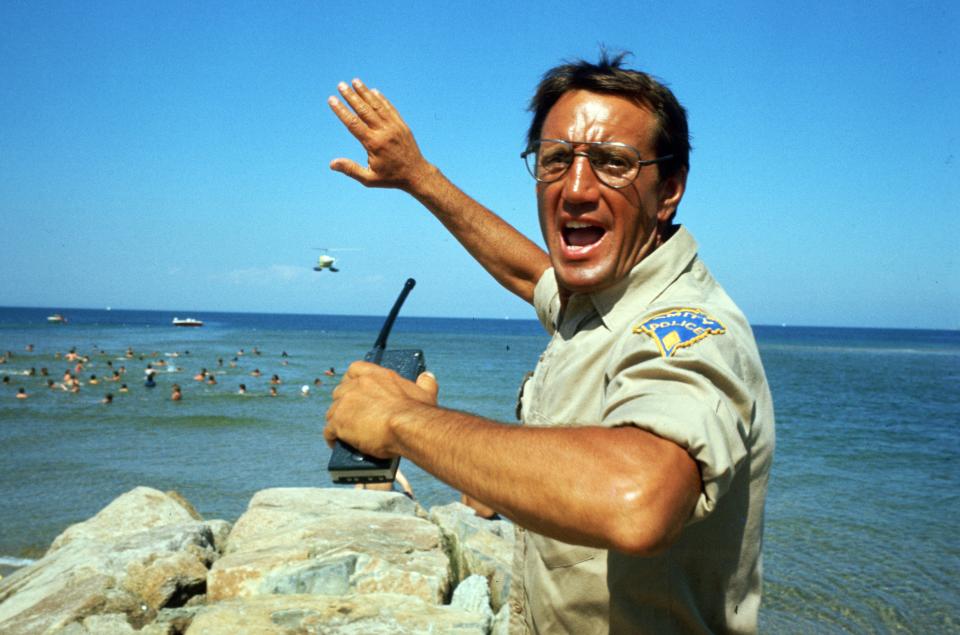Byline: HAL 9000. How will AI change the face of journalism?
Two-way TVs. Hidden microphones. Censored news. Secret police. And always, Big Brother — watching, watching.
We all know Orwell's "1984." Scary stuff. But one of his predictions was less noticed.
In the dictatorship of the future, Orwell says, writing will be done automatically. "Novel writing machines" will create the trashy books and newspapers read by the masses. Popular songs will be composed "entirely by mechanical means on a special kind of kaleidoscope known as a versificator."
And here we are.
AI is the bogeyman that haunts our dreams — already crowded with climate change, political instability, gun violence and pandemic. Machines, we're told, are on the brink of becoming aware. Could The Matrix be far behind?
Meanwhile, of more immediate concern to reporters: What will happen when all, or a large part, of the news we read is created by non-humans?
"You can never replace that depth of reporting and understanding and storytelling that a human brings," said Nick Hirshon, associate professor of journalism at William Paterson University in Wayne, and a former Daily News reporter.
Ready or not

Matters of Fact | A column about our lives in the age of media
AI, whatever it's going to do, is already well on the way to doing it.
In one month alone — May of this year — nearly 4,000 U.S. jobs were lost to AI. In what's left of newsrooms, what's left of the news staff, faces a gloomy prospect. This summer, the German tabloid Bild announced it was laying off a third of its staff; their jobs will be done by machine. Just as typesetters, compositors and layout people of a generation ago were ousted by automation, so now it could be the turn of editors, writers and that tribe of tech experts who look after such key things as SEO and audience engagement.

What that means for newspaper employment is depressingly clear — though some optimists insist that the jobs will not so much vanish as evolve. But what will it mean for the reader?
Would you — some have asked — want a chatbot writing your obituary?
In fact, such a program does exist. An AI tool called "Grace" has push-button empathy built in. It even allows you to choose the tone: "solemn," "humorous," "epic."
You can't make this stuff up. But AI can. It can pretty much make anything up.
Bottom line, a machine can't really replace a reporter. Can it?
Can it?
By the numbers
Before you answer, consider this scoop:
AMITY ISLAND, Aug. 17, 1975 – Panic has gripped the picturesque coastal town of Amity as a menacing great white shark strikes terror into the hearts of residents and tourists alike. In a harrowing turn of events, the predator's presence has forced local authorities to close the popular beaches, leaving the usually bustling summer town in a state of disarray.
Recognize this breaking news item? It is drawn, not from current events, but from the 1975 movie "Jaws." The program ChatGPT was asked to recast it as a news story — "inverted pyramid" style, with the key details up top.

As you can see, the machine didn't do a bad job. A small confusion with tenses, yes (it should be "struck terror," not "strikes terror"). Nothing a good editing app couldn't fix.
Then there's the generally hackneyed tone. "Picturesque coastal town of Amity..." "In a harrowing turn of events..." But that's precisely the kind of writing that human reporters do, every day.
“Prose consists less and less of words chosen for the sake of their meaning, and more and more of phrases tacked together like the sections of a prefabricated henhouse.”
So said Orwell — yes, him again — in a famous broadside, "Politics and the English Language." It is reporters, racing against a deadline, who are most likely to do this kind of erector-set writing, the hack journalism satirized in The Onion: "area resident," "promising local band." The novel machines in "1984" — and ChatGPT — are just the logical next step.
The real question raised by AI may be not whether machines can write like humans, but whether humans already write like machines.
Just the facts
"I think AI will be good at run-of-the-mill, everyday stories, stories that are crafted as information delivery systems," said Kevin Lerner, associate professor of journalism at Marist College in Poughkeepsie, New York. "AI can do facts in the proper order."
AI can do a lot of the routine stuff that used to be done, often, by entry-level reporters ("In a 6 to 2 vote, the zoning board overwhelmingly passed a measure that would...") It can do much of the drudgework of journalism: transcribing interviews, captioning videos, spell-checking and fact-checking, searches through reams of data.
"I think it will be incredibly useful for investigative reporters, because they can dig through a data base, or read a 300-page government white paper and summarize it, or look for anomalies," Lerner said. That, as reporter I.F. Stone once noted, is where the dirt is buried. "He said it's so much easier to hide something terrible in something boring," Lerner said.

AI could allow newsrooms to do more with less. Bad news for journalists, whose jobs will be lost. Good news — perhaps — for management. And maybe not so bad for readers. Up to a point.
AI could allow many more towns to be covered, at least superficially. Notes from municipal meetings could be automatically gathered and rendered in story form. Box scores from a hundred community sports events, which no paper could afford to staff, might be turned into something that resembles sportswriting. Though as a recent problematic rollout by Gannett suggests, this idea may not be quite ready for prime time.
Of course, any program that can spin raw information into convincing news stories could also turn bogus data into believable lies. Hooray! Just what the world needed. And what Orwell, in "1984," feared.
"AI is very good at taking things that sound credible and putting them into a format that could persuade people," Lerner said.
Read it and weep
What AI can't do is empathy. Though, as the "Grace" obit program illustrates, it can fake it (human reporters, at their worst, fake it too).
"We lose human emotion, the ability to detect nuance," Hirshon said.
And it can't do style — the essence of which is to surprise and delight the reader by the unexpected turn of phrase. It can only do clichés.
"I think it's less likely to replace a stylish magazine writer, someone who is trying to tell a human story," Lerner said. "Because it's not human. It can feed, theoretically, off the world's existing knowledge. It can recombine and reuse it in a very clever way. But it won't be truly new."
What AI especially can't do — what it can never be programmed to do — is play a "hunch." The essence of great reporting.
"AI might be able to write a story that reads well, but it's limited in its ability to get information that reporters since the beginning of journalism have gone to great pains to get," Hirshon said.
Basic instinct
Consider the movie "All the President's Men." You remember: the story of how Washington Post reporters Bob Woodward and Carl Bernstein unmasked the Watergate conspirators.
"I actually ran through 'All the President's Men' in my head, thinking what are the things that Woodward and Bernstein did that AI could not do," Lerner said.
"There's a scene where they go to the Library of Congress and they're sorting through thousands of library checkout slips to find out who checked out certain books. That's the kind of thing AI would be great at."
Where AI would fail is in following up an instinct. Because AI doesn't have instincts.
"Bob Woodward goes to the first bail hearing for the Watergate burglars," Lerner said. "If you had AI do it, it would say 'So-and-so pled not guilty, and the judge registered the plea.' It wouldn't say, 'Huh. That's weird. Let's find out more.' "
Worst of all, Hirshon said, a world dominated by ChatGPT journalism would produce no more Woodwards or Bernsteins. Nor anyone like them.
Lawrence Wright, Jodi Kantor, David Wallace-Wells, Robert Caro — such people, whose insights are based on years of reporting experience, might be considered guardians of our democracy. They would have no successors. There is a civic education that comes with doorbell-ringing, file-combing and confronting a senator. Such things are — or were — built into the newspaper trade. That would vanish.
Said Hirshon: "You're depriving a generation of learning all about these topics and being inspired."
This article originally appeared on NorthJersey.com: What does AI mean for journalism? Breaking down effects

